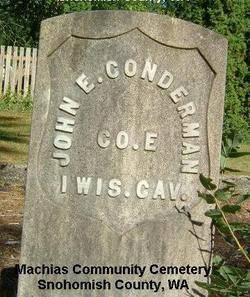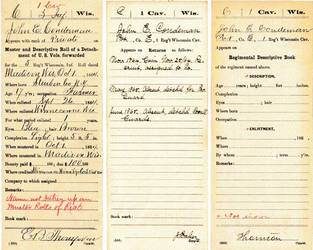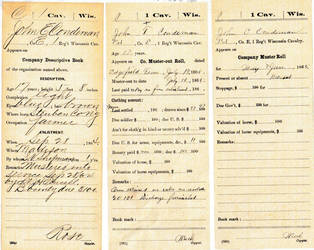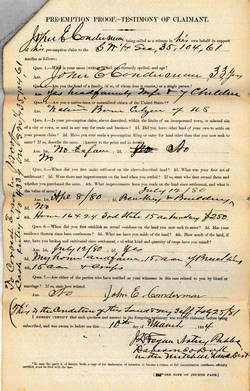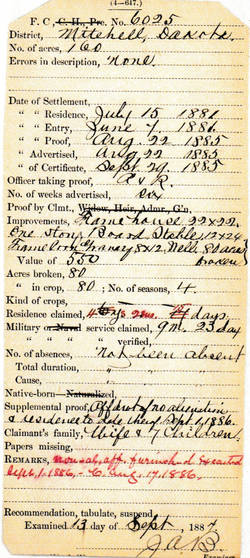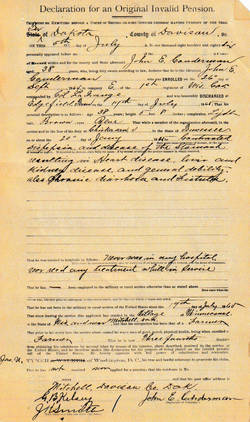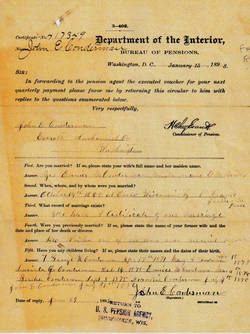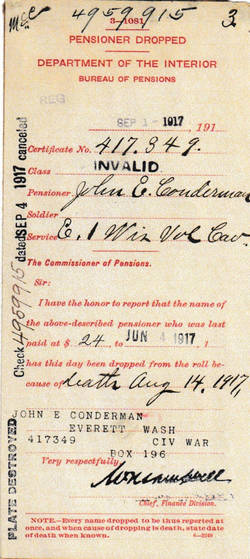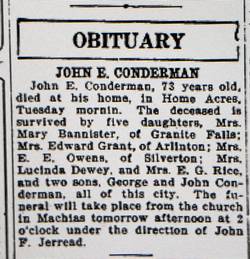Full Unit History
1st WISCONSIN VOLUNTEER CALVARY
Organized: Summer/Fall, 1861 Camp Fremont Ripon, WI/Camp Harvey Kenosha, WI
Mustered In: 3/8/62
Mustered Out: 7/19/65 Edgefield, TN
Regimental History
REGIMENTAL HISTORY:
The 1st, a three year western theater regiment left the state on 3/17/62 and headed for Benton Barracks located near St. Louis, MO. Later that same month it moved to Cape Girardeau and then to Bloomfield where companies were detached to various points in that state and into Arkansas for guard duty.
In September the entire regiment was ordered back to Cape Girardeau. This involved terrible hardships including wading through swamps, lack of good drinking water and supplies. The result was the unit being reduced to below half of its original strength because of sickness.
In 1863 the 1st was stationed at a number of points in Missouri. During his period the unit was engaged with the enemy at Chalk Bluff and Whitewater Bridge. The battle of Cape Girardeau followed.
Mid-June found the 1st in Nashville, TN. Late in the year it fought at Chickamauga, GA. In December it assisted in repulsing a force of Rebels who had advanced upon Mossy Creek, TN.
During 1864 the regiment was very active particularly in the Federal movements around Atlanta, GA. In October it returned to St. Louis to be remounted.
On 1/5/65 the 1st returned to Nashville, TN. From there it moved to WATERLOO, AL where it joined Wilson's cavalry expedition. During this movement the 1st was in the front ranks in a desperate assault upon a fort overlooking West Point. The fort was captured after a hand-to-hand struggle.
On May 6th a detachment of the 1st set out to search for fleeing Confederate States PRESIDENT JEFFERSON DAVIS. The advance guard came upon armed men who ordered them to halt then opened fire. The firing became general until a supposed captured prisoner told the 1st that they were fighting men of a Michigan regiment who had also been pursuing Davis. Although Davis was not captured until after the Union regiments had fired upon one another, many always believed that the 1st should have been entitled to some credit for the capture.
The fighting war having ended, the 1st was stationed at Macon, GA until May 24th. It then moved to Nashville, TN where, on 7/19/65 it was mustered into history.
Regimental losses: Officers Killed or Mortally Wounded: 6; Officers Died of Disease, Accidents, etc.: 7; Enlisted Men Killed or Mortally Wounded: 67; Enlisted Men Died of Disease, Accidents, etc.: 321.
Soldier History
SOLDIER:
Residence: Winneconne Winnebago Co., WI Age: 16.11 (est.) yrs.
Enlisted/Enrolled: 9/26/64 Madison Co. or Winneconne Winnebago Co., WI Rank: Pvt.
Mustered In: 9/26/64 or 10/1/64
Mustered Out: 7/19/65 Edgefield, TN
Highest Rank: Pvt.
Family History
PERSONAL/FAMILY HISTORY:
John Ezrah Conderman was born 3/10/47 in or near the community of Howard located in Steuben Co., New York. His parents were John Ezra (b. 1/5/17 Montgomery, NY) and Lucinda (nee Pickle b. 1/26/25 Howard Steuben Co., NY) Conderman. The Condermans were a farming family.
As far as can be documentally determined, John E. (henceforth John) was the third of four Conderman children. Older than John was Sister Mary (b. 6/17/43 Steuben, NY) and Brother Marcus "Mark" (b. 8/21/45 Steuben, NY). Younger than he was Brother George A. (b. 9/6/49 Steuben, NY).
On 9/26/64 in Madison Co. or Winneconne Winnebago Co., WI seventeen, or near seventeen, year old John received his father's permission to enlist in the U.S. Army. His unit of choice was the same regiment and company his younger brother had enlisted in some five weeks earlier. [1] At enlistment John's physical characteristics were as follows: 5'8" in height, light complexion, blue eyes and brown hair. For enlisting the young farmer received a $100 bonus or "bounty", a portion of which was generally paid up front with the balance to be received in later increments.
Private John Conderman joined his company and regiment on 11/25. He would be in the U.S. military for approximately seven months. Those seven months would affect the rest of his life.
As far as can be determined Private Conderman was not exposed to combat situations. Further, his duty assignments tended to be fairly non-threatening they being detached service as provost (military police) guard in May, 1865; and another guard assignment in June of the same year. Medical issues would prove more significant.
Private Conderman later claimed in June, 1865 he contracted dyspepsia or disease of the stomach which, post war, would result in his suffering from heart, liver and kidney diseases. However, the basis for the stomach problems appear to have stemmed from the months before June, '65. Major Steven V. Stipman of the 1st Wisconsin later recalled: "During the winter of 64/65 (John Conderman) was a soldier in my command. While encamped at WATERLOO, AL after the battle of Nashville (TN 12/15-12/16/64) the mouth of the Tennessee River was closed by ice. During the blockade our rations were exhausted. For about a week the command subsisted principally on very poor corn for animals. The corn had been damaged by water from a river flood (and as a result) a large number of the company suffered from diarrhea. The "Wilson Raid" through Alabama followed soon after this and as we were "living off the country" the changes of diet aggravated the disease in many cases and my recollection is that this soldier was one of the sufferers and that the disease continued after his muster out in July, 1865." More on this, later.
On 7/19/65 Private Conderman settled accounts with Uncle Sam. He was due pay ($13 per month) since the date of his enlistment. He had to pay a $37.47 clothing bill. He was still owed his $100 enlistment bounty and owed the government $11 for equipment. Part of this owing was because he decided to take home his saber and revolver. When all was said and done, John returned to his parents' Wisconsin farm.
******************************************************************************************************************************************
The next we hear from John is on 10/19/68. That is the date when, in Omro, Winnebago Co., WI he wed to Eunice Melissa Mills (b. 1/30/43 Elmira Chemung Co., NY). The marriage, the first and last for both, would produce nine children: Emily Viola (b. 9/27/69 Jackson Co., WI), George Henry (4/17/71 Jackson Co., WI), Mary Adelia (b. 11/15/72 Jackson Co., WI), Lucinda Jane (b. 2/16/74 Winnebago Co., WI), Eunice Melissa (b. 3/4/76 Jackson Co., WI) Bertha (b. 9/8/78 Jackson Co., WI) Frankie Irene (b. 7/4/80 Davison Co., SD), John Ezra (b. 7/4 or 31/82 Davison Co., SD) and Albert (b. 6/12/84 - d. 6/24/84).
As noted by the birth communities of John and Eunice's children, after marriage they took up farming in Jackson Co., WI. That was where five of their first six children were born. The fact that one of the six was born in Winnebago Co., likely means Eunice gave birth either at the home of her parents or John's. (In 1886 john would write that since leaving service had lived in village of Winneconne, Winnebago co., WI and near Mitchell in Davison co., Dakota Terr. (SD) It is unclear if Winneconne then spanned the line between two counties.)
During the early 1870s in Wisconsin John was plagued with chronic diarrhea which traced back to his days of Civil War soldiering. One doctor who knew him from Winneconne later testified he had known John since 1871 and in October, ‘77 until first of November had treated him daily when confined to bed at his father's home. During this period he could not work to support wife and family, so his father paid for his medical bills and medicine.
Medical frailties aside, circa 1879 John and Eunice packed up their family and moved from Wisconsin to the Dakota Territory. The 1880 census found them farming there in Township 103 of Davison County. Although what had prompted the move is not documented, it was likely the availability of free homestead farm as in early-mid April John and family settled on and filed papers on a 160 acre homestead tract.
There is evidence that the initial family homestead residence was a 16 ' x 24" sod dwelling. By June, '81 with the completion of construction on a single story wood frame house, the sod dwelling - with the addition of some boards - became a stable. Also constructed was an 8'x 12' corn grainery.
In 1884 John made final proof to the land office that he and his family had resided continuously on the property which they had cultivated and farmed for four seasons. In September of that year a certificate of ownership was issued. This ultimately led to John receiving a patent (deed) to the land.
On 7/5/86 while in the Dakota Territory, John began the paperwork to obtain a U.S. Government disability pension based on his diarrhea, dyspepsia and disease of the stomach contracted while in the service to his country. By this time the stomach issues had result in not only heart and liver disease, but even more seriously, oozing rectal fistulas. As told by John, the story goes like this:
"Sometime when (we were) in Mitchell I was walking along the street on my way to see the doctor that I was under the care of at the time when something like a bag, as big as the skin would hold, came down into my rectum. I went in and showed it to him. He said he'd never seen anything like it. All (this) stuff came down, but it would not come out.
I would not let him cut me, so he prescribed flax seed poultices. It finally blistered with spanish fly blisters. The blisters brought holes through and the stuff came (out). It was just manure and matter. The holes (fistulas) have been there ever since." Not long thereafter the former Yankee trooper was pensioned at $12 per month based on chronic diarrhea and resulting disease of the rectum and the heart.
As an interesting side note to John's military history, on Friday December 6, 1889 the following article appeared the Daily Republican, the "Official" paper of (Mitchell) City and (Davison) County, South Dakota:
"HELPED TO CAPTURE JEFF”.
J.M. Adams, Esq. of this city is endeavoring to secure a bounty of about $300 for John E. Conderman for his share in the capture of Jeff Davis. Conderman, who is one of Davison county's substantial farmers, was a member of the First Wisconsin cavalry, which with the Fourth Michigan surrounded and captured the arch traitor in hoop-skirts. President Johnson offered a bounty of $100,000 on May 2, 1865 for the capture of a number of confederate notables supposed to be involved in the plot to assassinate Lincoln, and the then head of the lost cause was among the number.
The news of Jeff's death which occurred early this morning gives Mr. Conderman's matter an added interest." It is doubtful anything came of this grass roots movement!!
At some point during 1890 the Condermans quitted what was then Mitchell Davison Co., South Dakota and moved westward to the Puget Sound region of Washington Territory/State. Again, what had prompted the move and exactly when it occurred is not documented.
Although there is some evidence that John and family initially settled in or near the community of Snohomish located in Snohomish County, by October, 1891 it appears they had moved north of there to Arlington which is also in Snohomish County. In Arlington Mr. Conderman sought an increase in his pension stipend based on where initially had been one fistula, now there were two. Both were causing him great pain and making it unable for him to perform manual labor.
As far as his laboring, somewhere and at some point during this time period John was employed by "a railroad" as watchman on a bridge. "Then," he said "they sent me to Sedro (Wooly - a town in Whatcom County north of Snohomish County) to wipe engines, watch engines, and such things. I had men and my boy to help me. I could not do the work. That was when they (perhaps the railroad people?) advised me to come down here (to Everett) and have Dr. Thomas doctor me."
Thus it was that during 1895 John, Eunice and their seven living children moved southward to Everett, the largest city in and the county seat of Snohomish County. John continues: "When (we) got to Everett Dr. Thomas said he could cure me for $50. My boys got the money and gave it to him, but when he examined me he said he could not cure me. He would if he could operate on my fistulas, (but) I could not take ether for the operation because of my heart. He was afraid to operate and gave our money back.”
“I have had no other treatment here except when my fistulas would get stopped up and I had to have help emptying them. Dr. Phelps, now of Arlington emptied me once when I got swelled up and inflamed.”
“I have two or more fistulas though which the discharge comes when I have a passage of my bowels. There seems to be some kind of stricture. Sometimes the discharge gets down there and I can't get it out. It becomes inflamed and has to be taken out. I have to squeeze it out through my anus with my fingers. The holes open into the rectum higher up and it seems to leave a sack below into which the discharge (accumulates). I have to take my fingers and squeeze it down and press it against my backbone. When I press it down with my fingers to get it out it burns like fire. I have no power to force it out. I have to wear a pad of cotton there all the time.”
“I have no control over the discharge coming out. The (fistula) holes are outside the sphincter, so when passage comes I have to press cotton and get somewhere to change clothes sometimes twice a day. I am unable to prevent passing even during the night. My wife won't sleep with me."
Not being able to work during this period, John said that from 1895 to 1897 he obtained food by "fishing for salmon in the (Snohomish) river with a pole." Around this time his pension stipend was increased to $24 per month.
For several weeks during the summer of 1896 John took a job in Everett's Gray and Faulkner shingle mill "jacking bolts". This involved him standing on a platform over a stream by which pieces of timber were floated to the mill. With a small pike pole he carried (guided) the pieces in the water to where they would be caught by a cable chain elevator and carried into the mill. It was light work that "even a boy could handle", but even so, he was not able to work every day. When he not able to do the job one of his sons would cover the job for him.
During the summer of 1899 John worked in a mining camp in the hills. According to his telling, he was sent there as company for the men, but also to split a few shakes to put on the (cook) shack and help cook. This last a month, maybe and month and a half.
Somewhere along in these years John took a job for $100 to set up a shanty on a mining claim. By his telling, “I could do nothing, so hired a felon man to do the work. He fooled along, so I got nothing."
John again, "When I came back I went around with a post office petition not to move it from the one side of town to the other and also to remove the postmaster who was also the editor of the local newspaper. I think I got $13.30 for that, just what people threw in for my doing it. I did that from July to about two weeks before the election. I worked some days and some days I didn't. I could quit when I felt like it and go home. Some days I had it (the petition) out and some days I didn't.”
On 2/15/00, after residing in Everett for five years John obtained a job as janitor in the Snohomish County Courthouse. The job paid $50 per month. According to John the county commissioners hired him with the understanding that one of his sons would help him with the tasks which he described as follows: “We have seven rooms. Five are in use. The others are upstairs and the occupants rarely use them. We have fires to make in the five rooms downstairs each morning. We keep the rooms upstairs supplied with kindling and coal, but the occupants have to start their own fires if they use the room.”
“I have a boy (John E.) who will be eighteen on the fourth of July. He goes to school, but helps me in the morning and the evening after we build the fires the occupants attend then during the day.”
“After we take the mail to the office there is nothing to do until 2:00 when I have to carry the mail again. After that there is nothing to do until 5:00 when we have to sweep out the five offices and bring in the kindling and coal for the next morning. My boy carries the kindling and coal most of the time, but I can carry a bucket of coal and even carry two of them sometimes. I take it slow and easy. If I get tired I sit down.”
“Since I have been the janitor I think twice I attended to all the fires in the morning by myself, but when it comes to sweeping and evening work my boy always helps me. My daughter mopped the auditor’s office one night. I did it myself once and my boy did it another. I don't think I could do the work of a janitor alone. If I tried too much I would be in bed."
About this same time John found that his political leanings and actions brought him to the attention of some of the powers that be in Everett. This resulted in efforts to strip him of his U.S. Government disability stipend. This all seems to have started with a letter written to the U.S. Pension bureau by one F. M. Sloan which read as follows: "There lives in our city one John Condrman who boasts that he is the strongest man in Everett and that he has a "Cinch" in the pension department. He draws $25 ($24) per month and gets $65 per month from the city for work performed.....He runs a grocery store and rents buildings to the city for election purposes. There are other old soldiers more worthy that draw but $6 per month. Will not an investigation be in order?"
As a result of this and, perhaps, other such missives, the Pension Bureau began an investigation into John's disability status. As part of this process he was to undergo a new medical examination and a worker was assigned to the case to ensure this was done properly. As for John, he was more than willing to undergo the examination, but not in Everett where he felt pension/medical board members were prejudiced against him on political and personal grounds. According to John it was against his best interests to go before these individuals who had been “appointed during the Cleaveland administration and were against any and all old soldiers drawing pensions.”
The individual assigned to John's cases submitted the following report. "I had the pensioner appear before the Seattle board. While it does not appear from the nature of his disabilities that he could well aggravate them for purposes of the exam, but thought it best to take no chances, so gave him no notice until I called upon him to accompany me which was about one hour before the departure of the boat from Everett (to Seattle.) He readily consented to this."
"Since 2/15/00 the pensioner has been a janitor at the court house in Everett. When I met him he was carrying a hod of coal in each hand from the bin in the rear of the building to the court house a short distance away. He seemed to carry the coal with little difficulty as any man would do."
"There is nothing in his general appearance or in his motion as we walks on the street to indicate any great disability. He has long hair and a long brown beard streaked with tinges of gray. His cheeks, forehead and across the bridge of his is unusually red. He says people think that because of that he has been drinking. He says, however, those areas are always red and I know it remained that way during the two days he was with me. He says he does take a glass of beer and sometimes a drink of whiskey, but never has been drunk in his life. The only indication of ill health that is visible is that his cheeks are shrunken. His cheek bones are prominent and he walks considerably stooped. His gait is somewhat peculiar, a kind of shambling or walking with his feet farther apart than usual."
The man went on to say “The pensioner is uneducated. He can write his name, but cannot read. He is somewhat of a politician and worker at the polls and in this way takes and interest in everything that comes up. That way he makes political enemies, of course."
"He assumes the inquiry (into his disability status) is due to the office of the present postmaster. Everett is a long drawn out site composed of "bayside" at one end and (illeg.) on the other. A year ago it (the post office) was moved over on the bayside to the disgust of the residents on the other side. A petition was (then) presented to the postmaster protesting the move."
The Everett postmaster is also editor of a local paper. The pensioner showed me an editorial column in which the editor/postmaster says to the effect that a certain pensioner who is assumed to be unable to work had shown considerable political activity and intimated that his case might be looked into. He also said members of the Everett (pension medical examination) board said they would "cut him down" or "cut him off" and for that reason he would not go before them for an examination.”
He continued, “As I before stated, the pensioner walks along the street briskly and to one not acquainted with the nature of his disability he does not seem to be disabled, but the certificate of the board shows that he has a very great disability. I was present when he was examined and think I would rather lose a foot than to be in his condition.”
“(As a result of all of this), the examination board surgeons seemed to find no material disease of the heart, but noted the pensioner seems think his heart trouble is the greater disability of the two. He would not ride up to the doctor's office with me in the elevator, but relied upon the stairs. He said when he rides in an elevator his heart stops and he faints and has to be carried out."
In 1903 further questions were raised regarding Mr. Conderman's state of disability. Another physical examination undertaken at the time found he had disease of the rectum (claims he does not have control over his bowels. He has very bad diarrhea. Oozing feces requires constant cleaning) was nervous, weak and generally debilitated to the point where his hands were soft and his muscles weak. The concluding opinion was "he may not be able to perform manual labor."
As of 1903 John was fifty nine years old. At that time we get our first look at his vital statistics. He was 5'10" in height; 155 pounds in weight, dark complexioned, had blue eyes and dark hair. No occupation was listed.
On 10/24/08 John's wife, Eunice, died. No details are available pertaining to her passing. She was buried in Machias, Snohomish Co., WA.
In the 1910 census John was noted as a widower. In that tally he indicated he was able to earn a wage by working in a saw mill.
John Conderman died 8/14/17 in Everett Snohomish Co., WA. At death he was residing on 36th street which is on the east bank of the Snohomish River. Burial was/is beside Eunice in the Machias Snohomish Co., Cemetery.
Following his father's passing, son George utilized Everett attorney and Civil War veteran, Robert T. Warner (unit. d. buried GAR cem. Sno) to seek reimbursements for his father's funeral expenses from the U.S Government. The success or failure of this endeavor is not known.
***********************************************************************************************************************************************
[1] George A. Conderman enlisted in and mustered into the 1st Wisconsin Cavalry Co. "E" as a private on 8/16/64. He was wounded 4/14/65 (location not specified). He died of those wounds on 4/18/65.
Cemetery
Buried at Machias Community Cemetery
